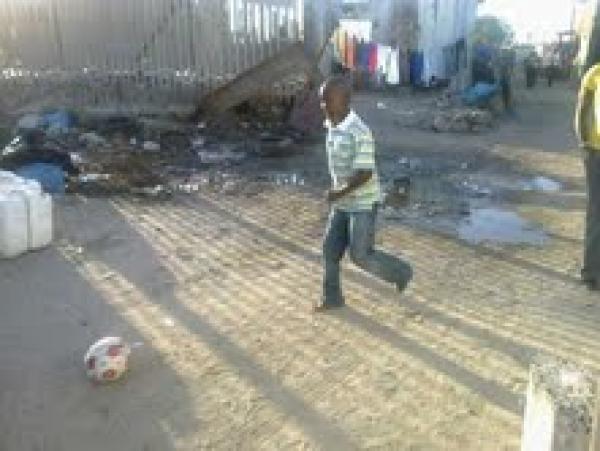Two children killed by illegal connections

Andile Duvane was electrocuted on Wednesday 13 March while playing soccer with his friends. He stepped on open electrical wires outside Metrorail’s substation at the RR section in Khayelitsha.
According to witnesses, Andile was trying to retrieve his ball that had strayed alongside the fencing surrounding the power station when he, barefoot, tripped on an open wire and was electrocuted. He died immediately.
Then, on Sunday 17 March, the life of an eight year old child was ended abruptly by electrocution at the same substation. The child was electrified by live wires of illegal electrical connections, running from houses situated on the other side of the railway line to the shacks on the opposite side of the rail. The eight year old child’s family refused to speak to the media because the incident was too recent and the family was grieving.
Community members of RR section illegally extract electricity from lit-up housing on the opposite side of the railway line and these lines run across the rail through a small gap leading into the substation’s property and exiting to the other side. The lines provide electricity to the shacks and cause the power station to have multiple connection lines running alongside it.
This substation is situated between Nolungelo train station and Nonqubela train station and is fenced by steel bars. Alongside the power station is a dumping site where community members throw rubbish and dirty dish/bath water. Tires are used as stepping stones in the water for commuters to go to the railway stations making this a hazardous environment.
The substation is surrounded by the RR section informal settlement, where Andile Duvane stayed with his mother and four siblings. The grade 5 learner of Sobambisana Primary School loved playing soccer, explained his mother, Bulelwa Duvane. He was the second of five children.
The 32 year old mother recalled how Andile’s younger brother came running home, screaming that his brother had been shocked and was lying in the dumped water alongside the power station. When she arrived at the scene and found her son dead, the live electrical wire was still underneath his left foot.
“If we had electricity in our houses none of this would have happened,” she said.
The mother makes a living from selling meat and does not know where she’s going to get the money for her son’s burial.
“The family is gathering money to assist me to bury my son but I don’t know if we’ll have enough. We’re planning to put Andile to rest over the weekend,” explained a tearful Duvane.
In an e-mailed reponse to GroundUp, Jolene Henn, (Corporate Affairs – Provincial Communication and Stakeholder Manager for Eskom in the Western Cape Province) clarified that it was not the substation that claimed the two innocent lives. Rather that both incidents were caused by illegal and unsafe connections, and that these connections were not made from the substation but from Eskom customers across the railway tracks.
Henn did provide information based on their investigation about the Sunday’s incident in the RR section in Site B and continued to say that RR section is a ‘wetland’ for which electricity is not providerd. The illegal wires were passing over the little boy’s household (a shack which does not have electricity). In the process the illegal wire made contact and energised the shack, which in turn energised the yard (connected to the shack), and the gate. According to the witnesses, the boy was electrocuted while trying to open this gate.
Henn continued to explain that Eskom is not allowed to provide electricity to people living in wetlands, road reserves, and railway reserves in accordance with the rules of electricity provision as stipulated by The Department of Energy and Municipalities. She emphasized that Eskom continuously engages with communities to inform the community about the dangers of these unsafe and illegal connections. Regular school visits and customers forums are conducted to create awareness around the impact of these unsafe acts. “Eskom further urges that the community must report illegal connections or any unsafe electricity act as it is always innocent children that are victims of such acts,“ Henn said.
However Ntombifikile Sukwana who has been living in RR section since 2006 said that she didn’t know anything about the dangers of illegal electricity connections because she uses paraffin and that she never once was involved in any workshop held by Eskom. And 32 year old Khayalethu Mtamzeli said that since he arrived in RR section he has never heard of any workshop or meeting held by Eskom but confirmed that he does hear of people getting shocked by the electricity.
Metrorail had not responded to our request for comment by publication time.
Support independent journalism
Donate using Payfast

Don't miss out on the latest news
We respect your privacy, and promise we won't spam you.
Next: GroundUp 20 - 26 March is Published!
Previous: Toilets

This article is licensed under a Creative Commons Attribution-NoDerivatives 4.0 International License.
